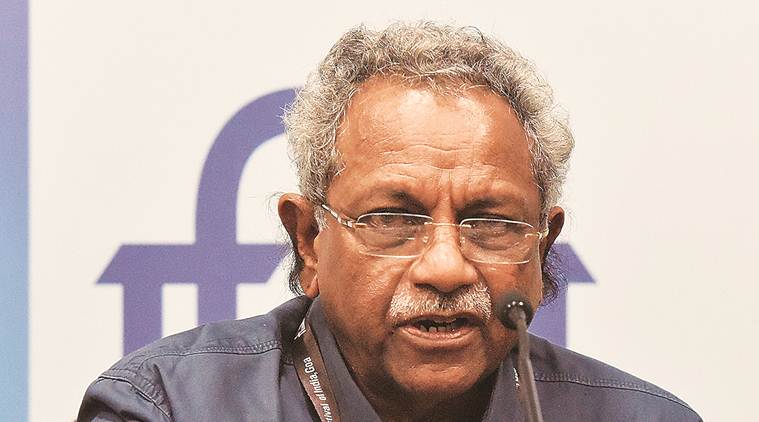
Renowned filmmaker Shaji N Karun’s classics like Piravi (1988), Swaham (1994), Vanaprastham (1999) and Kutty Shranku (2010) among others were screened at the recently concluded 11th edition of Bengaluru International Film Festival (BIFFES) in the retrospective category.
In an exclusive conversation with indianexpress.com, Shaji shared his views and regrets about the current state of cinema. He also suggested ways to preserve the art of cinema and how the audience can develop sensibilities to appreciate good cinema.
Below are excerpts from the conversation:
Did you catch any movies at BIFFES?
Quite a lot. I watch the most important films even at Cannes, Kolkata, Goa (international film festivals).
What was your favourite film that was screened in this edition of BIFFES?
I liked Cold War (directed by Paweł Pawlikowski). It had a very good human element. I think it was one of Pawlikowski’s finest films. It was even much better than Roma.
Your films are generally based on the theme of grief.
For me, pain is the most honest expression. If I ask you to laugh, you can laugh. If I ask you to shed tears, it’s difficult. The religion, rules, law among other things are formed based on past pain/problems. And all our epics are formed from the pain of society. Cinema is a tool to express your mind.
You will stick with similar themes in the future too?
My next film is based on the idea of the human ego. The current ego is different from the ego several centuries ago. There’s a lot of growth in that.
Do you experience the sadness of your protagonists while writing them?
I use a lot of motive to underline that idea. Whether it is rain, water, sound, colour or the space characters live in, these all are related to the idea. In Piravi, the missing son was the tool to express my pain.
What inspired you to make a film on ego?
Olu was an idea of innocence. The next one will be based on ego. Human passions can be decorated, decoded or layered. Cinema is one of the strongest tools to do that.
Being an art-film director, you have also worked with the biggest superstars (Mohanlal and Mammootty) of Malayalam cinema.
In one way, they (Mohanlal and Mammootty) are suffering as the works they do all have the same ingredients. Cinema is being lost because of them. The sensitivities and sensibilities are being lost because of the idea of superstars among the common man. In Tamil Nadu and Bombay, which is being ruled by commercial cinema, people don’t speak about acting. Now the heroes are all about the money; Rs 100 crore, Rs 200 crore. Where is art today? Art is becoming meaningless in front of the capitalist. That’s one of the biggest tragedies we are facing.
The Malayalam film industry has been making more meaningful movies than other industries in the country. At the same time, do you think the superstars in Malayalam cinema have the sensibility to ditch their stardom for the sake of art?
Many films are based on a certain kind of pre-occupied vision of making money. The performance side of heroes and heroines are restricted to a certain scale. It is a very narrow job for them. The actors must know what they are missing. Therefore when our kind of films are offered to them, they do it. It is like an actor going to the theatre/stage communicating directly to the people. The artists love to do the cinema with a different kind of language and vision once in a while.
Do you see yourself doing films for streaming platforms, which will be released in theaters first to become eligible for Oscars?
Oscars is not a good way to measure whether a cinema is good or bad. It’s a market place. Whatever they discover, it will be sold. It is a promotion, and Netflix has sufficient money to do it. There are even better films than Roma that didn’t reach people. If a thousand films are made, we need curators to tell us which are the good ones.
Will you do films for Netflix or Amazon Prime Video?
I make films. I don’t make films for them. But if they are interested to take it on their platforms, I don’t see any reason to say no.
How can the new generation develop sensibilities to appreciate good cinema?
The person who understands creativity should continue his work for the next generation. That’s missing now. Either the person makes one film and disappears. Or make more films but the quality from his first film is not there. That’s a problem. Who are they controlled by? Or are they true to the art of the cinema? There is a huge difference between the number of films we make and the number of films being premiered at Cannes or Berlin. Several films from Vietnam, Indonesia, Malaysia and even Sri Lanka are making a mark. We need to understand that something is going wrong and identify where we need to correct ourselves. That kind of bigger thought is not happening. There is no road map or vision.
How do you see the popular argument that the audience comes to the theater expecting only entertainment?
The biggest markets all over the world keep people ignorant. Like, advertisers tell us ‘Buy this. This is good.’ There is an element of keeping the intelligence level (of the people) down. That’s what market needs.
So what are the ways the audience can overcome this challenge, besides attending film festivals?
You know Shakespeare but you don’t know Dostoevsky. Children know only about mainstream writers. Education at the primary level should teach children to distinguish between good and bad. Otherwise, education has no meaning in cultural development.